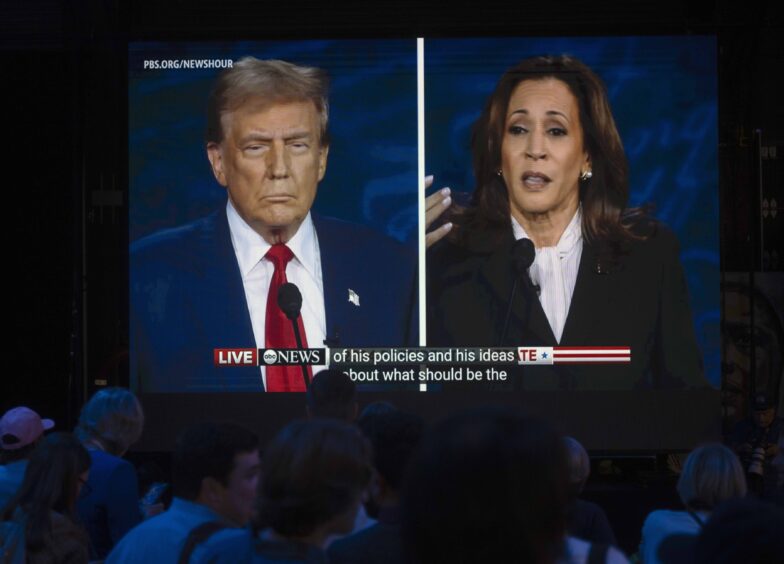
I am struck by the vibrant energy that fills the air this autumn in Washington DC. It is after all a season of change, and the atmosphere reflects the weight of the choices ahead.
On the eve of the US elections, many are calling it one of the most consequential elections in modern history. The outcome will not only shape US domestic policy but will also have far-reaching implications for international relationships, particularly for us in the UK. Potential policy shifts under either a Harris or Trump administration will significantly influence the UK’s energy security, critical mineral access, and climate finance.
1. Green industrial policy and the energy transition
A potential Harris administration is expected to extend President Biden’s pro-climate agenda, prioritising international partnerships and green investment. The US Inflation Reduction Act (IRA), with an allocation of $369 billion over ten years to renewable energy and climate initiatives, signals this commitment. A Harris administration would create stronger opportunities for transatlantic investment, supporting UK growth in renewable sectors like offshore wind, hydrogen, and battery technology. If this momentum continues, the UK government could look to joint initiatives with the US, easing access to funding for green projects and making significant progress toward the UK’s 2050 net zero target.
However, under Biden the IRA has faced criticism from some manufacturers and international trading partners for its reliance on domestic supply chains, which could limit the availability of components needed for the UK projects, Should this happen, the UK may have to seek alternative sources, complicating the UK’s green transition.
A Harris administration is expected to support favourable trade policies for green technologies, facilitating UK imports of renewable technology components. This could support efforts by the UK government to make US-UK trade in renewables more accessible and reducing reliance on non-allied suppliers for clean tech components.
If Donald Trump is re-elected, his previous administration’s affinity to roll back environmental regulations could limit the UK’s potential for US green investment. Trump’s policies have historically favoured fossil fuels over renewables, raising concerns about long-term climate commitments and support for developing green industry and infrastructure at home and abroad.
Trump’s protectionist stance could make UK trade in green technologies more expensive, as seen in past tariffs on steel and aluminium. If a similar approach extends to critical minerals, the UK government may need to counter these costs by increasing subsidies for UK-based manufacturers of renewable technology, reducing dependency on high-cost imports. This could mean allocating a significant portion of the budget to incentivise local clean tech industries, creating a more resilient domestic green economy.
2. Critical minerals and securing supply chains
A Harris administration would likely focus on secure allied supply chains, such as through the Minerals Security Partnership (MSP), facilitating UK access to critical minerals. Resources like lithium are fundamental for the UK’s electric vehicle (EV) and renewable sectors, making it essential for the UK to consider increasing funding for mineral procurement partnerships in its budget. Joint ventures in processing and securing critical minerals would reduce UK dependency on China, ensuring a stable supply chain for technologies central to the energy transition.
However, reliance on US exports could still pose risks if protectionist measures are enacted, the UK may need to diversify its mineral supply sources further to mitigate these risks.
In contrast, Trump’s policies may lean toward domestic production and a protectionist approach, potentially restricting US exports of critical minerals. If faced with limited US supply, the UK may need to further strengthen alternative partnerships with Australia or Canada, to secure these essential resources. This would likely require the government to allocate a larger portion of spending for mineral sourcing and develop incentives for UK-based mineral processing industries, shielding the country from possible US export restrictions.
3. Climate finance and international commitments
Harris’s anticipated support for international climate finance aligns with the UK’s goals, allowing the UK government to potentially allocate matching funds for green development projects. With US contributions to international climate funds, such as the Green Climate Fund, a Harris administration would enable the UK to access additional financial support for green infrastructure projects, making ambitious UK initiatives more achievable.
Nevertheless, any cuts to these funds would require the UK to reassess its climate financing commitments and potentially adjust budgetary priorities.
Trump will deprioritise US climate finance and has promised to withdraw once again from the Paris Agreement. Upholding UK leadership in climate finance will require budget adjustments to support global climate initiatives. Such a shift would likely place additional financial pressure on the UK government .
Under a Harris administration, the UK government could strengthen the UK’s renewable energy goals through increased US cooperation in critical minerals, green technology, and climate finance, minimising the need for heavy domestic spending.
And a Trump administration would likely prioritise US energy independence and domestic production, requiring the UK to allocate more resources to self-reliance in minerals, energy security, and green tech investment. This scenario would demand a more robust fiscal commitment to secure the UK’s energy transition and climate objectives.
Kruthika Anastasia Bala is the managing director of Resources Now, an energy and natural resources insights and collaboration hub
Recommended for you

 © Brian Cahn/ZUMA Press Wire/Shutt
© Brian Cahn/ZUMA Press Wire/Shutt